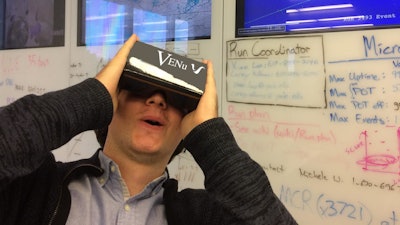
Not so long ago, observing fundamental particles was reserved for scientists with complex equipment. Now, technological progress mean anyone can explore the world of particles from their phone.
VENu is a new, free smartphone app, designed by Oxford University scientists, to support would-be physicists to see neutrino activity and to even try to catch them themselves.
The app is made up of data gathered by scientists from the Microboone experiment, launched to detect and understand neutrinos, which are subatomic, almost weightless particles that only very rarely interact. They are notoriously difficult to capture but state-of-the-art detectors, like Microboone, in the USA, are now recording neutrino interactions. The footage captured enables scientists to understand more of this elusive and puzzling particle.
Neutrinos are considered a fundamental building block of matter, and are fascinating to scientists. They carry no electric charge and can travel through the universe almost entirely unaffected by natural forces, and are therefore very difficult to detect.
A 3D platform, VENu works with Google Cardboard and is designed to exhibit both virtual and augmented reality features. The personal virtual reality viewer allows users to understand the many complexities and intricacies of the Microboone experiment and to learn more about neutrinos.
The platform includes game features that provide users with brain teasing challenges, putting them in the mind-set of professional particle physicists. These include simulating neutrino interactions against a cosmic ray background, similar to the way neutrino physicists run their analysis.
Professor Ian Shipsey, Head of the Particle Physics Department of the University of Oxford says: "Seeing neutrinos in 3D with VENu is fascinating! The interactive and educational sections are a great portal to the ghostly world of the mysterious neutrinos!"
The VENu App launch on Monday, January 30, 2017, and is free to download from Apple store and Google Android Marketplace.






















